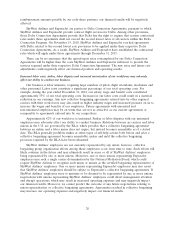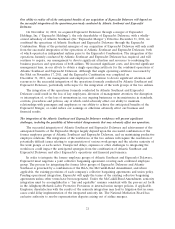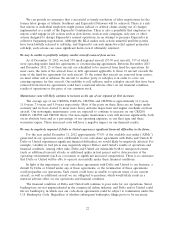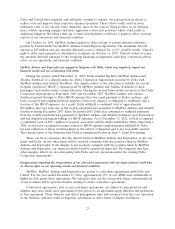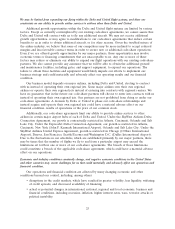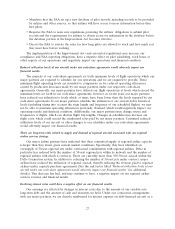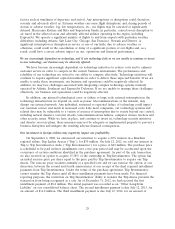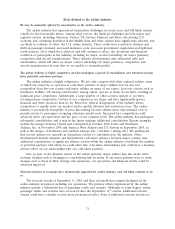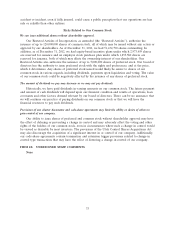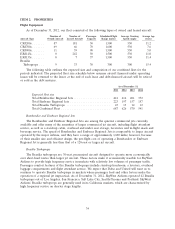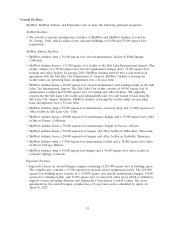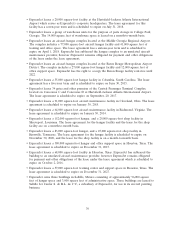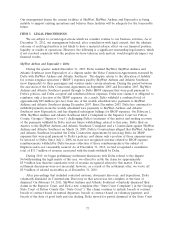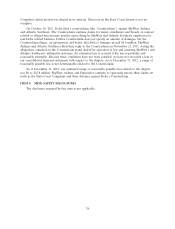SkyWest Airlines 2012 Annual Report Download - page 32
Download and view the complete annual report
Please find page 32 of the 2012 SkyWest Airlines annual report below. You can navigate through the pages in the report by either clicking on the pages listed below, or by using the keyword search tool below to find specific information within the annual report.pass-through cost. The reimbursement of the interest expense is recorded as passenger revenue in our
consolidated statements of income. Thus, a decline in interest expense associated with contract aircraft
would likely be offset by a reduced aircraft ownership cost passed through to our major partners.
Interest expense decreased $3.0 million, or 3.7%, during the year ended December 31, 2012, compared
to the year ended December 31, 2011. The decrease in interest expense was substantially due to a
decrease in interest rates and the majority of this reduction was passed through to our major partners.
Interest income decreased $0.3 million, or 3.7% during the year ended December 31, 2012, compared
to the year ended December 31, 2011. Interest income is not a component of our contractual
arrangement with our major partners. If interest rates were to decline, our major partners would
receive the principal benefit of the interest expense decline, since interest expense is generally passed
through to our major partners; however, if declining interest rates reduce our interest income, our
financial results will be negatively affected.
Our insurance costs have increased and further increases in insurance costs or reductions in coverage could
have an adverse impact on us.
We carry insurance for public liability, passenger liability, property damage and all-risk coverage
for damage to our aircraft. As a result of terrorist attacks occurring during recent years, aviation
insurers significantly reduced the amount of insurance coverage available to commercial air carriers for
liability to persons other than employees or passengers for claims resulting from acts of terrorism, war
or similar events (war-risk coverage). At the same time, these insurers significantly increased the
premiums for aviation insurance in general.
The U.S. government has agreed to provide commercial war-risk insurance for U.S.-based airlines
through December 31, 2013, covering losses to employees, passengers, third parties and aircraft. If the
U.S. government ceases to provide such insurance beyond that date, or reduces the coverage provided
by such insurance, we will attempt to purchase insurance coverage, likely with a narrower scope, from
commercial insurers at an additional cost. To the extent this coverage is not available at commercially
reasonable rates, we would be adversely affected.
While the price of commercial insurance has generally declined since the period immediately after
the 2001 terrorist attacks, in the event commercial insurance carriers further reduce the amount of
insurance coverage available to us, or significantly increase the cost of obtaining such coverage, we
would be adversely affected.
We could be adversely affected by an outbreak of a disease that affects travel behavior.
In 2010, there was an outbreak of the H1N1 flu virus which had an adverse impact throughout our
network. In 2003, there was an outbreak of Severe Acute Respiratory Syndrome (‘‘SARS’’), which had
an adverse impact on travel behavior. In addition, in the past there have been concerns about
outbreaks or potential outbreaks of other diseases, such as avian flu. Any outbreak of a disease
(including a worsening of the outbreak of the H1N1 flu virus) that affects travel behavior could have a
material adverse impact on our operating results and financial condition. In addition, outbreaks of
disease could result in quarantines of our personnel or an inability to access facilities or our aircraft,
which could adversely affect our operations and financial condition.
Interruptions or disruptions in service at one of our hub airports, due to adverse weather or for any other
reason, could have a material adverse impact on our operations.
We currently operate primarily through hubs in Atlanta, Los Angeles, Houston, Minneapolis,
Detroit, San Francisco, Salt Lake City, Chicago, Denver, Houston, Washington, D.C., Newark,
Cleveland and the Pacific Northwest. Nearly all of our flights either originate from or fly into one of
these hubs. Our revenues depend primarily on our completion of flights and secondarily on service
28




